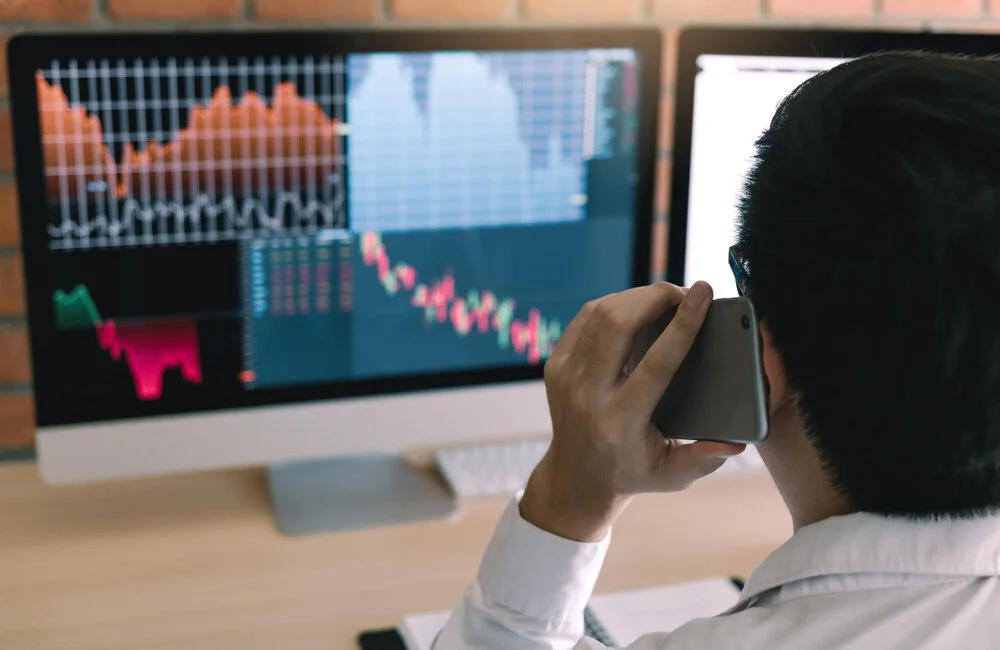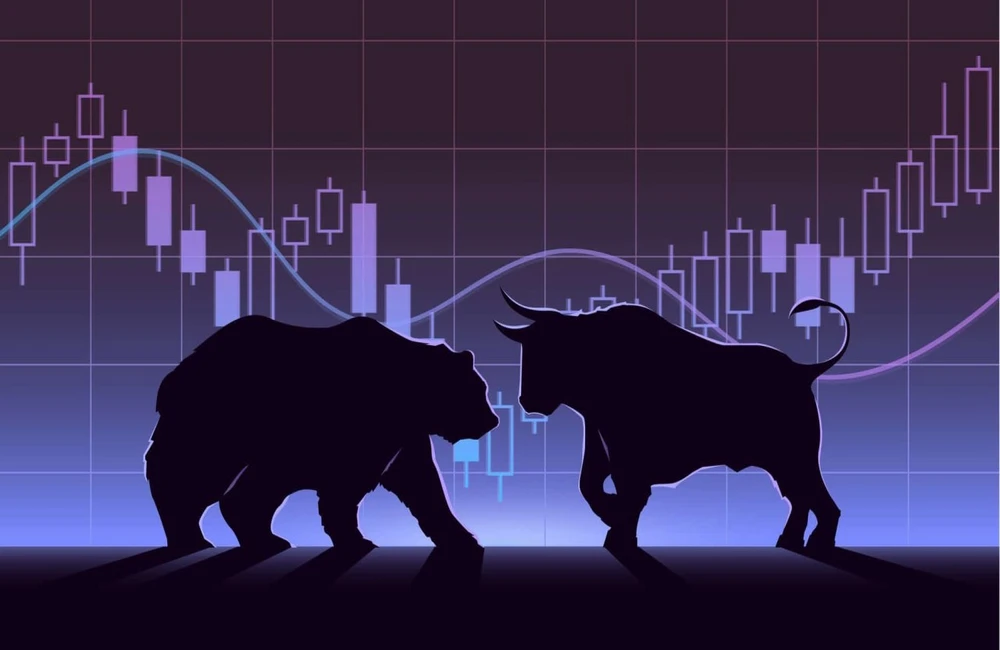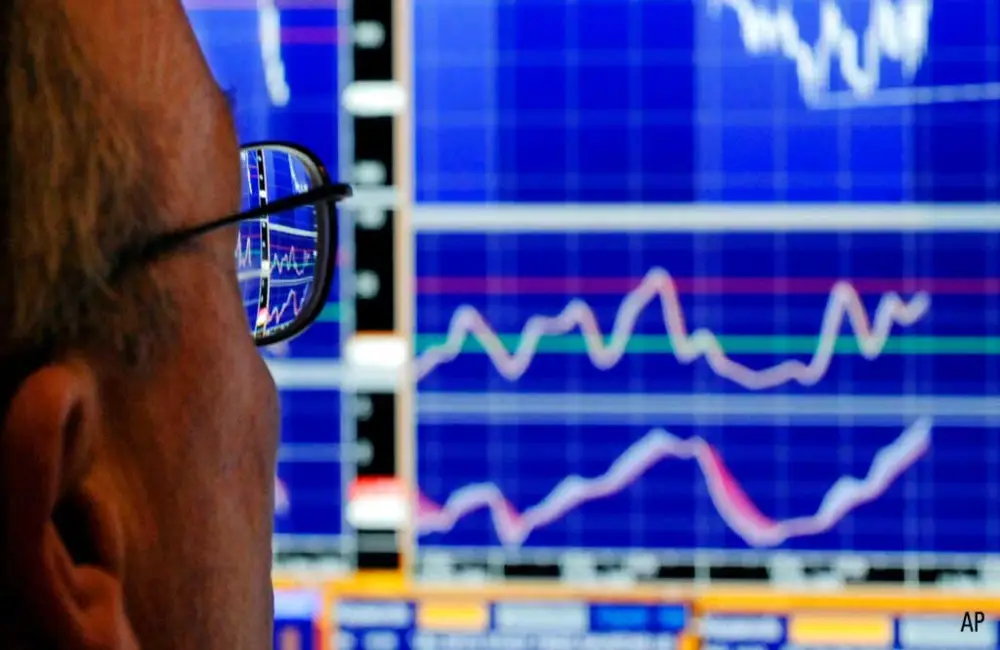ASX futures fell 55 points or 0.8% to 6964 at 8.00 am on Friday, before pointing to steep losses at the open for the second straight day.
The S&P 500 finished down 2.4 percent, and the Dow Jones Industrial Average fell 1.9 percent. The technology-heavy Nasdaq Composite Index fell 2.7%. The major indexes had logged small losses for most of the day but dropped more sharply in the last hour of trading.
The European Central Bank on Thursday detailed plans to increase rates for the first time in over a decade in July and followed by another potential increase in September. The hawkish pivot sent European shares tumbling with President Lagarde saying risks to the inflation outlook were now “primarily on the upside”.
US traders are poised for the latest inflow of inflation data, scheduled to arrive on Friday (Saturday AEST), that is likely to backstop the following lap of trading for markets, while also impacting the Federal Reserve’s interest-rate plans for the rest of the year. The Fed’s June meeting will take place next week, with the central bank widely expected to increase its key interest rate by half a percentage point, a step it is expected to repeat in July.
“We need more data on inflation, and if the next few pieces of information we get confirm that the heat is coming off the economy, that the economy is not going to be overly hot, that the Fed after June and July can be a little less hawkish into the fall,” said Tim Holland, chief investment officer at Orion Advisor Solutions. “That’s what the markets are hoping for.”
On the home front, the S&P/ASX 200 finished down 1.4% at 7019.7, dragged lower by mining, financial and real-estate shares. The benchmark index gradually drifted lower in the first 90 minutes of trade on a subdued US equities lead and remained in the red.
Lithium miners Allkem, Liontown, Pilbara Minerals and Lynas fell between 4.2% and 6.2%, while iron-ore heavyweights Fortescue, Rio Tinto and BHP lost between 0.3% and 2.4%. Banks ANZ, NAB, Commonwealth and Westpac lost 2.3% to 3.7% on fears for the effect of higher rates on a cooling housing market, while the property-trusts sector dipped 1.55%. Shares of energy producers rose again on soaring wholesale prices. The ASX 200 is down 3.0% for the week so far.
Magellan recovered somewhat from a wadsmash in the opening of trade on Monday, up 2.2% at $12.82, after news its co-founder Hamish Douglass would rejoin the wealth manager in a consulting role.
In commodity markets, Brent crude oil was down 0.5% at US$122.91 a barrel. Iron ore dropped 2.1% to US$143.85. Gold fell 0.1% to US$1850.70.
In local bond markets, the yield on Australian 2 Year government bonds fell to 2.69% and that on 10 Year rose to 3.60%. In the US, two year Treasury note yields shot to 2.81% and 10 year US Treasury note yields rose to 3.04%.
The Australian dollar was quoted at 70.95 US cents as compared to 71.90 US cents at the previous close. The Wall Street Journal Dollar Index, which measures the US dollar against 16 other currencies increased to 96.06.
Asia
Chinese shares finished the day lower even as data showed a jump in the country’s exports in May. Sentiment was dampened by fears that authorities have started to impose new lockdown restrictions in some areas of Shanghai. A new round of Covid-19 testing will begin in Shanghai’s Minhang district on Saturday, with authorities instructing residents to stay home in the meantime. The Shanghai Composite Index declined 0.8% to 3238.95, the Shenzhen Composite Index fell 1.8% to 2045.70 and the ChiNext Price Index dropped 3.0% to 2500.21. Chinese liquor shares finished lower, with Kweichow Moutai falling 0.7% and Wuliangye Yibin losing 1.2%.
Hong Kong’s benchmark Hang Seng Index dropped 0.7% to 21869.05, pulled down by consumer-related and electronics stocks, though the property sector gained ground. China Resources Beer lost 5.1% and Haidilao tumbled 5.0%, as Sunny Optical and AAC Technologies declined 5.8% and 1.6% respectively. Shipping firms fell as freight rates languished and fears scaled over demand prospects. Cosco Shipping Holdings fell 7.7%, while Orient Overseas plummeted 11%. Tech shares were mixed after strong gains on Wednesday. Alibaba Group climbed 2.3%, while Meituan slid 3.1%. Property was an outlier the other way, with China Resources Land, Longfor Group and Country Garden gaining 2.0%-2.4%.
The Nikkei Stock Average ends flat at 28246.53 as gains in auto and energy stocks offset losses in tech and shipping shares. Nissan Motor rises 1.9% and Subaru Corp. up 2.1%, after the yen's recent decline raises expectations for profit growth. Wider Topix index also finishes little changed at 1969.05. Investors eye the European Central Bank’s policy decision later in the global day and its impact on bonds and currencies.
Europe
European stocks ended lower after the European Central Bank said that it would begin raising interest rates in July. The pan-European Stoxx Europe 600 lost 1.4 percent, the German DAX declined 1.7 percent and the French CAC 40 dropped 1.4 percent.
The European Central Bank announced plans in July to raise rates for the first time in more than a decade, with another hike possible in September, surprising investors with such sudden hawkishness. President Lagarde said that the risks to the inflation outlook were now “primarily on the upside.”
The ECB might be “late to the party” but seems determined to raise rates, which has provided “fresh impetus to the rush to sell stocks,” IG analyst Chris Beauchamp writes. “Investors see oil prices today, and they know that high CPI [consumer price index] numbers aren’t disappearing, so hope for a deceleration in the rhythm of central bank tightening was likely to remain a mirage.”
London’s FTSE 100 index ended down 1.5 percent on Thursday, as fortunes turned downward for global markets, despite a rise in oil. Concerns over high inflation and a weakening economy dragged the retail sector into negative territory, with online grocer Ocado losing 3.9% and retailer Kingfisher 3.6% lower.
“It’s been another poor session for European markets as the early week optimism of the lifting of restrictions in China is surrendered to the reality of China’s zero-covid policy,” Chief Market Analyst at CMC Markets UK Michael Hewson says in a note. On the positive side, Melrose Industries climbed 4.2%, extending its run for the week.
North America
US stock benchmarks suffered their largest drops in more than three weeks Thursday as traders waited for inflation data that will shape how quickly the Federal Reserve raises interest rates this year.
The S&P 500 finished down 2.4 percent, and the Dow Jones Industrial Average dropped 1.9 percent. The tech-heavy Nasdaq Composite Index fell 2.7%. The chief indexes registered small declines for much of the day, before dropping more sharply in the last hour of trading.
Traders and strategists say the inflation data may have a big impact on the next phase of trading for markets, and may help to inform Federal Reserve interest-rate decisions later this year. The central bank’s June meeting takes place next week, and it is widely expected to increase its key interest rate by a half-percentage point with widely expected aftereffects to the July meeting.
“Once we see a couple more data points on inflation hopefully they’ll corroborate that things are coming off the boil and the Fed after June and July can be a little less hawkish into the fall,” Tim Holland, chief investment officer at Orion Advisor Solutions said. “That’s the hope of the markets.”
For most of this year, investors had been adjusting their portfolios to reflect the end of easy-money conditions in the US. Now traders have to factor in tighter policy in the eurozone too. On Thursday, the E.C.B. said it would raise its key interest rate from minus 0.5 percent to zero or above by September, and likely more afterward. The central bank has signaled it will begin with a quarter-percentage point hike in July. It also announced that it would stop its large-scale bond-buying program on July 1.
The announcement sent stocks tumbling in both the US and Europe. The pan-continental Stoxx Europe 600 finished almost 1.4% lower.
The US and European central banks’ decisions come as inflation worldwide remains a burden on households. On Friday, investors will receive an updated snapshot of inflation in the US with the release of consumer-price index data for May. Economists polled by The Wall Street Journal forecast the reading will show inflation in the US was unchanged in May, coming in at an annual rate of 8.3%, the same from April.
“The concern here in the US is the Fed tightening into an economy that is already turning over,” said Leo Grohowski, chief investment officer of BNY Mellon Wealth Management. “The ECB is tightening into an even sharper slowdown; that could weigh on global growth, which would then be another headwind to company earnings.”
The bulk of the debate across markets has moved to what the Fed might do at its September meeting. Until a clearer picture develops, some traders have been reluctant to take large positions in the market, investors and strategists say.
That has resulted in more choppy trading in recent sessions, some strategists say, as they seek to gauge whether this year’s market selloff has found its bottom, or whether more pain remains in store. Others are also taking into account the possibility of an eventual US recession.
“They’re not have any strong personal conviction one way or the other, and they’re taking chips off the table,” said Viraj Patel, a global macro strategist at Vanda Research. “They don’t want to be caught offside in either direction.”
The S&P’s sectors for communications and technology both closed roughly 2.8 percent lower—the steepest declines for the index. The consumer staples sector fell the least by 1.5%.
“People need deodorant and paper towels and cereal even if they might need to cut spending,” said Ryan Belanger, managing principal at Claro Advisors, a Boston-based wealth-management firm.
Tesla shares fell 0.9%, or $6.48, to $719.12 after reversing earlier gains. An auto regulator in the United States said it was widening an investigation into crashes involving Tesla vehicles and cars of first responders at emergency sites. The electric-vehicle manufacturer remains on track to stretch its rally into a fourth day. Tesla stock has been under siege this year, losing 32% through Thursday, as investors fled shares of growth companies. Chief Executive Elon Musk’s plan to buy Twitter has also weighed on the stock.
Five Below shares dropped approximately 1.4%, or $1.86, to $133.51 after the discount retailer showed a drop in first-quarter earnings as operating costs rose. In the Treasury market, the yield on the benchmark 10-year Treasury rose to 3.041%, from 3.028% Wednesday. Bond prices and yields move in opposite directions.
























